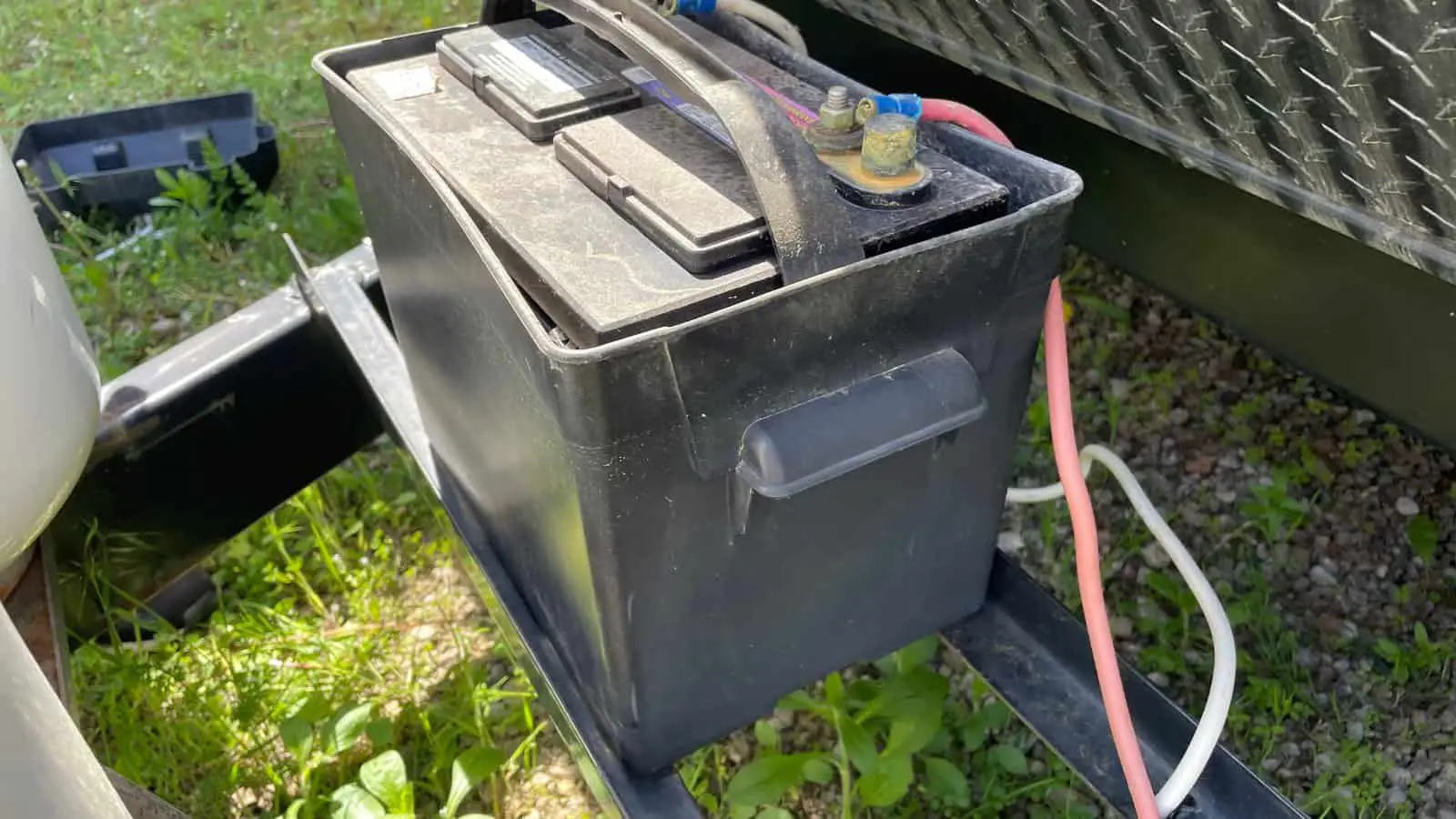Proper maintenance and replacement of your travel trailer’s batteries are essential for optimal performance and ensuring a comfortable and enjoyable RV experience. In this article, we’ll explore various aspects of battery care, from understanding battery types to troubleshooting common issues.
Understanding the Types of Batteries Used in Travel Trailers: Lead-Acid, AGM, and Lithium
There are three main types of batteries used in travel trailers:
- Lead-acid batteries: These traditional batteries are affordable and widely available but require regular maintenance, such as checking and refilling water levels.
- Absorbent Glass Mat (AGM) batteries: AGM batteries are maintenance-free and more resistant to vibrations and temperature fluctuations, making them a popular choice for travel trailers.
- Lithium batteries: Although more expensive, lithium batteries offer longer life, faster charging, and better performance in a wide range of temperatures.
How to Properly Store and Maintain Travel Trailer Batteries During Off-Season Periods
During off-season periods, it’s essential to properly store and maintain your travel trailer batteries to prevent damage and extend their lifespan. Follow these steps:
- Disconnect the batteries and remove them from the travel trailer.
- Store the batteries in a cool, dry place, away from direct sunlight or heat sources.
- Use a battery maintainer or trickle charger to keep the batteries charged during storage.
The Role of Battery Chargers and Maintainers in Extending Travel Trailer Battery Life
Battery chargers and maintainers play a crucial role in prolonging the life of your travel trailer’s batteries. While battery chargers replenish a depleted battery, maintainers help keep the batteries at an optimal charge level, preventing overcharging and undercharging. Invest in a quality battery charger and maintainer to ensure your batteries remain in top condition.
Take a look at our article on: Best 6 RV Battery Box For Your RV And Camper
Regularly Inspecting and Cleaning Travel Trailer Battery Terminals and Connections
Regular inspection and cleaning of battery terminals and connections are vital to prevent corrosion and ensure efficient power transfer. At least once a year, remove the battery cables, clean the terminals and cable ends with a wire brush or terminal cleaner, and apply a corrosion inhibitor to protect against future corrosion.
Troubleshooting Common Travel Trailer Battery Issues: Sulfation, Low Voltage, and Short Circuits
Some common travel trailer battery issues include:
- Sulfation: Occurs when the battery is left in a discharged state, causing lead sulfate crystals to build up on the battery plates. Sulfation can lead to reduced battery capacity and performance. Use a desulfating charger to help reverse the process.
- Low voltage: If the battery voltage drops below the required level, appliances and systems in the travel trailer may not function correctly. Check the battery charger and connections for any issues.
- Short circuits: Short circuits can cause battery drain and damage. Inspect the wiring and connections for signs of damage or wear, and replace as necessary.
How to Safely Remove and Replace Your Travel Trailer’s Battery
To safely remove and replace your travel trailer’s battery:
- Turn off all appliances and systems in the travel trailer.
- Disconnect the battery cables, starting with the negative cable, followed by the positive cable.
- Remove the old battery and replace it with a new one, ensuring it’s the correct type and capacity for your travel trailer.
- Reconnect the battery cables, starting with the positive cable, followed by the negative cable.
Upgrading Your Travel Trailer’s Battery System for Increased Capacity and Performance
To upgrade your travel trailer’s battery system, consider the following:
- Replace older lead-acid batteries with AGM or lithium batteries for improved performance and longevity.
- Add additional batteries in parallel to increase your travel trailer’s overall battery capacity.
- Install a battery monitoring system to help you track battery health and performance, enabling more efficient energy management.
- Consider adding solar panels or other alternative charging methods to supplement your travel trailer’s electrical system.
The Importance of Proper Battery Ventilation in Your Travel Trailer
Proper battery ventilation is essential to prevent the build-up of dangerous gases, particularly hydrogen, which can be emitted during charging. Ensure your travel trailer’s battery compartment has adequate ventilation and is not sealed to allow gases to escape safely.
How to Accurately Test Your Travel Trailer’s Battery Capacity and Performance
To test your travel trailer’s battery capacity and performance:
- Use a multimeter to measure the battery’s voltage. A fully charged 12V battery should read around 12.6-12.8 volts.
- Perform a load test using a battery load tester to check the battery’s ability to deliver power under load.
- Check the specific gravity of each cell in a lead-acid battery using a hydrometer to evaluate the battery’s state of charge.
The Benefits of Solar Panels and Other Alternative Charging Methods for Travel Trailer Batteries
Solar panels and other alternative charging methods offer several benefits for travel trailer batteries:
- Reduced dependence on shore power or generators, allowing for more off-grid camping opportunities.
- Extended battery life, as solar panels help maintain an optimal charge level.
- Lower environmental impact and reduced noise from generator use.
Travel Trailer Battery Maintenance: Water Levels, Specific Gravity, and Electrolyte Levels
For lead-acid batteries, proper maintenance involves regularly checking:
- Water levels: Ensure the water levels are maintained between the minimum and maximum markers. Refill with distilled water as needed.
- Specific gravity: Use a hydrometer to measure the specific gravity of each cell, which indicates the battery’s state of charge.
- Electrolyte levels: Inspect the electrolyte levels in each cell to ensure they are covering the battery plates.
Understanding the Impact of Temperature and Climate on Travel Trailer Battery Performance
Temperature and climate can significantly impact travel trailer battery performance:
- Cold temperatures can reduce battery capacity and slow down the charging process.
- Hot temperatures can cause the electrolyte to evaporate, leading to battery damage and reduced life.
To minimize the impact of temperature and climate, store your batteries in a temperature-controlled environment and keep them properly charged.
How to Choose the Right Battery for Your Travel Trailer’s Specific Power Requirements
To choose the right battery for your travel trailer:
- Determine your travel trailer’s power needs by calculating the total amp-hours required for your appliances and systems.
- Choose a battery with a capacity that can meet your power needs for the desired duration of use.
- Consider upgrading to AGM or lithium batteries for improved performance and lifespan.
Tips for Extending the Life of Your Travel Trailer’s Batteries Through Proper Charging Habits
To extend the life of your travel trailer’s batteries:
- Avoid overcharging or undercharging your batteries, as both can cause damage and reduce battery life.
- Use a quality battery charger and maintainer to maintain optimal charge levels.
- Regularly monitor and test your batteries to ensure they are functioning correctly.
The Role of Battery Isolators and Protectors in Maintaining Your Travel Trailer’s Electrical System
Battery isolators and protectors help maintain your travel trailer’s electrical system by:
- Preventing power from being drawn from the starting battery when using appliances and systems in the travel trailer, ensuring you can still start your tow vehicle.
- Protecting your batteries from overcharging, undercharging, and short circuits.
How to Properly Store and Transport Travel Trailer Batteries to Prevent Damage and Ensure Safety
Proper storage and transportation of travel trailer batteries are crucial to prevent damage and ensure safety. Follow these guidelines:
- When transporting batteries, keep them upright to avoid electrolyte leakage and secure them to prevent movement during transit.
- Store batteries in a cool, dry, and well-ventilated area, away from direct sunlight or heat sources.
- Use protective covers or battery boxes to shield the batteries from damage and accidental short circuits.
- Disconnect the batteries from the travel trailer and any charging sources during storage.
- Installing a Battery Monitoring System to Track Your Travel Trailer’s Battery Health and Performance
A battery monitoring system is an invaluable tool for keeping tabs on your travel trailer’s battery health and performance. It provides real-time information on battery voltage, current draw, state of charge, and more. Installing a battery monitoring system can help you manage your power usage more efficiently and identify potential issues before they become significant problems.
The Significance of Battery Recycling and Proper Disposal of Old Travel Trailer Batteries
Battery recycling and proper disposal are essential for several reasons:
- Many battery components, such as lead and acid, are hazardous to the environment and human health.
- Recycling batteries helps conserve natural resources and reduces the demand for raw materials.
- Most states and localities have regulations governing battery disposal, and improper disposal can result in fines.
When it’s time to dispose of your old travel trailer batteries, take them to a designated recycling facility or participate in a battery recycling program.
Maintaining and Replacing Travel Trailer Batteries in Parallel and Series Configurations
When maintaining and replacing batteries in parallel or series configurations, it’s essential to:
- Use batteries of the same type, capacity, and age to ensure even charging and discharging.
- Check all connections and wiring for signs of wear or corrosion, replacing as necessary.
- Replace all batteries in the configuration simultaneously to prevent imbalances and potential damage to the new batteries.
Troubleshooting and Resolving Issues with Travel Trailer Battery Chargers and Converters
Common issues with travel trailer battery chargers and converters include:
- Not charging: Check for loose or corroded connections, blown fuses, or a faulty charger/converter.
- Overcharging or undercharging: Inspect the charger/converter’s settings and verify that they’re appropriate for your battery type.
- Erratic voltage output: This could indicate a problem with the charger/converter’s internal components and may require repair or replacement.
Addressing these issues promptly will help ensure your travel trailer’s batteries remain in optimal condition and provide reliable power when you need it.
Good luck, and happy camping!
Check out our article on: What Are The Best Rv Battery (Deep Cycle, Lithium, AGM)

